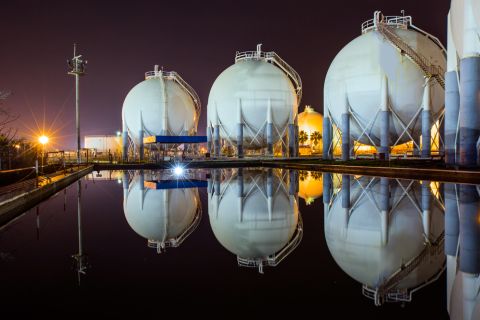[Editor's note: This story was updated from a previous version posted at 7:35 a.m. CT Jan. 31.]
Weaker crude oil and gas prices drove quarterly results sharply lower at Exxon Mobil Corp. and Chevron Corp., pushing down shares at the two largest U.S. oil producers and signaling a weak start to the new year.
While one-time asset sales or write downs were large factors, the two companies said earnings suffered from weaker margins in crude oil, natural gas, chemicals and fuel production. They gave tepid outlooks for the near term.
"There's no silver bullet on improving returns in a flat commodity price environment," said Chevron CEO Mike Wirth. "You roll up your sleeves and you get to work on all the little things."
Shares of Exxon Mobil and Chevron were both at least 3.5% lower in trade on Jan. 31, pressured by the results and worries about slowing global economic growth.
Fourth-quarter results at Exxon Mobil fell below Wall Street's recently lowered estimate, with earnings sliding to $5.6 billion from $6 billion a year ago. Per share profit excluding one-time gain from asset sales was 41 cents, below Wall Street's estimate of 43 cents.
Chevron swung to a loss of $6.61 billion from a year-earlier profit of $3.73 billion. The company had $10 billion in charges including writedowns on the value of oil and gas properties that were no longer economic to pump. Excluding charges, its $1.49 cent a share profit topped estimates.
This week, Royal Dutch Shell Plc's shares hit a three-year low after it laid out a plan to pull back on share buybacks amid slower global growth. BP Plc and Total SA report financial results next week.
Exxon Mobil CEO Darren Woods said its natural gas, refining and chemicals businesses have suffered from prices near or at decade lows. Exxon Mobil will keep investing in new projects on the belief that a growing global middle class will drive demand for its products, Woods said, describing the margin weakness as "a short-term impact."
Exxon and Chevron are racing in the Permian Basin, the top U.S. shale field, to each reach 1 million barrels per day of production, but neither is anywhere near that level right now.
Exxon Mobil’s output rose 54% from a year ago while Chevron's gained 36%.
Values are down across the oil and gas sector, prompting ongoing speculation that large companies will acquire smaller ones in the Permian Basin. Woods, though, said that the best opportunities are usually the ones “that you can generate organically.
Recommended Reading
Hirs: LNG Plan is a Global Fail
2024-03-13 - Only by expanding U.S. LNG output can we provide the certainty that customers require to build new gas power plants, says Ed Hirs.
Belcher: Our Leaders Should Embrace, Not Vilify, Certified Natural Gas
2024-03-18 - Recognition gained through gas certification verified by third-party auditors has led natural gas producers and midstream companies to voluntarily comply and often exceed compliance with regulatory requirements, including the EPA methane rule.
Exclusive: The Politics, Realities and Benefits of Natural Gas
2024-04-19 - Replacing just 5% of coal-fired power plants with U.S. LNG — even at average methane and greenhouse-gas emissions intensity — could reduce energy sector emissions by 30% globally, says Chris Treanor, PAGE Coalition executive director.
Belcher: Election Year LNG ‘Pause’ Will Have Huge Negative Impacts
2024-03-01 - The Biden administration’s decision to pause permitting of LNG projects has damaged the U.S.’ reputation in ways impossible to calculate.
Exclusive: ‘Reality Has Hit,’ NatGas Not Just a Bridge Fuel, Landrieu Says
2024-04-11 - The Biden administration's LNG pause is "disappointing" and natural gas is a "solution to energy woes," co-chairs for Natural Allies for a Clean Energy Future Senator Mary Landrieu and Congressman Kendrick Meek told Hart Energy's Jordan Blum at CERAWeek by S&P Global.





